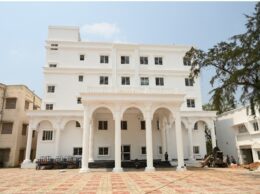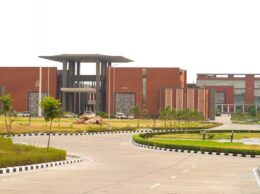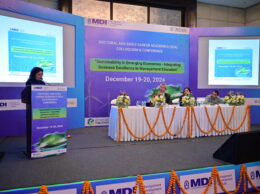CHENNAI : Indian Institute of Technology Madras is establishing a new research centre that will test wastewater in a city for indicator organisms and chemicals and make the data available to the public. The facility will act as an intelligence unit to track and prevent a virus outbreak in its early stages.
The International Centre for Clean Water (ICCW) is establishing this Wastewater-Based Epidemiology (WBE) research facility. This project is being supported with funding of US$ 1 Million by CryptoRelief, an initiative started by Mr Sandeep Nailwal.
The data obtained from various wastewater sources and treatment facilities will be analyzed and made available to the public through dashboards. Gradually, this facility will be extended to other parts of India.
The benefits of wastewater analysis include water fingerprinting to study the chemical and biological molecules in it. The WBE project includes aspects such as tracking pollutants, pesticides, licit and illicit drugs to which the population is exposed.
Highlighting the impact of this project, Prof. T. Pradeep, a Padma Shri Awardee and Professor-in-Charge, International Centre for Clean Water (ICCW), IIT Madras, said, “Ensuring clean water for people needs a detailed understanding of wastewater. The ICCW team will work on building a hydro-informatics platform for the city with appropriate modelling tools to give spatiotemporal information of the data derived from WBE studies.”
The WBE will also be employed to detect the emerging issues of concern, such as increasing antimicrobial resistance due to excessive consumption of antibiotics. Identifying the right policies to control pharmaceuticals and personal care products will be of great value in improving public health.
ICCW has been developing state-of-the-art technologies for affordable clean water. Creating a reliable platform for periodic analysis of wastewater will ensure better water security for the community. IIT Madras and ICCW envision providing practical solutions to build a healthier country through wastewater-based epidemiology research
Speaking about this project, Mr. Sandeep Nailwal, Founder CryptoRelief, said, “We intend to help the public, policymakers, practitioners and public health officials combat the ongoing Covid 19 pandemic through wastewater analysis.”
The CryptoRelief fund has successfully been funding several healthcare-related activities in the country.
This grant would help in advanced research and getting a foresight into the ever-evolving virus patterns whilst also giving us a chance to better prepare. With the worldwide outbreak of COVID-19, it has been challenging to understand its transmission. This calls for a better understanding of the population’s health to predict and control the disease spread, be it a pandemic or an endemic and this new centre at IIT Madras will tackle this need
Wastewater carries molecules that correlate to what people consume and how their health is changing. At an individual or household level, toilet waste can tell a lot about the user. For a city, the sewage gives information about the health of its inhabitants. Wastewater-based epidemiology (WBE) is a way to understand this and may be considered as mining of chemical information from sewage.
Apart from SARS Cov-2, several other pathogens prevailing in a population can be detected through analysis of wastewater. Techniques for analysis include polymerase-chain-reaction (PCR) and mass spectrometry (MS), combined with data analytics.









